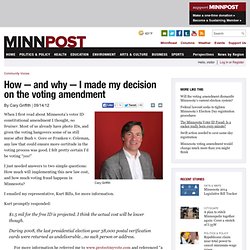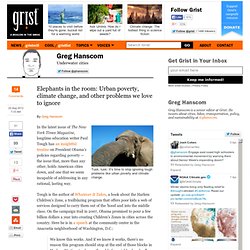

Why mass shootings don't convince gun owners to support gun control. One thing I often hear in the wake of these endless mass shootings is, "Surely this will convince those gun people.

Surely the carnage and suffering are bad enough now that they'll feel compelled to support some gun control. " This betrays a fundamental misunderstanding of the cognitive and emotional dynamics at work. It presumes that mass shootings constitute an argument against guns, to be weighed against arguments in their favor. But to gun enthusiasts, mass shootings are not arguments against guns but for them.
This one-sentence explanation of ISIS is brilliant. The story of ISIS's rise is long, complicated, and almost impossible to explain simply.

But this tweet, from the brilliant Lebanese writer Karl Sharro, does the near impossible — it provides a really smart explanation of ISIS's rise that's only a sentence long. It is, to be fair, a very long sentence: You want the simple one-sentence explanation for what caused ISIS? Pic.twitter.com/S7u9iOXdPH — Karl Sharro (@KarlreMarks) December 1, 2015 Sharro's tweet is, first and foremost, a brutal satire of simple explanations of ISIS's rise — like Thomas Piketty's somewhat silly claim that ISIS is the result of economic inequality.
Yet it's also a really cogent, concise explanation of the big-picture story behind ISIS's rise. After the end of British, French, and Ottoman imperial rule in the early to mid-20th century, Arab leaders failed to establish anything like stable democratic societies. Kuong Ly: I am the refugee you are rejecting. This week, in the wake of the terrorist attacks in Paris, the US House of Representatives and governors from across the country rallied for a single purpose: to deny Syrian refugees entry under the banner of “security.”

This unfounded antirefugee sentiment is nothing new. But when Massachusetts Governor Charlie Baker staked his position opposing resettlement, the insult to me was deeply personal.
Environment. Food. Advertising: Pantene Philippines Ad Breaks Down Workplace Stereotypes. The Economist explains: Why does the debt ceiling matter? How — and why — I made my decision on the voting amendment. Cary Griffith When I first read about Minnesota’s voter ID constitutional amendment I thought, no brainer.

Most of us already have photo IDs, and given the voting hangovers some of us still nurse after Bush v. Elephants in the room: Urban poverty, climate change, and other problems we love to ignore. Tusk, tusk: It’s time to stop ignoring tough problems like urban poverty and climate change.

In the latest issue of The New York Times Magazine, longtime education writer Paul Tough has an insightful treatise on President Obama’s policies regarding poverty — the issue that, more than any other, holds American cities down, and one that we seem incapable of addressing in any rational, lasting way. Tough is the author of Whatever It Takes, a book about the Harlem Children’s Zone, a trailblazing program that offers poor kids a web of services designed to carry them out of the ’hood and into the middle class. On the campaign trail in 2007, Obama promised to pour a few billion dollars a year into creating Children’s Zones in cities across the country.
Another “subprime” crisis: Student loans. For any student struggling to pay for college, government-backed student loans are a much better deal than private student loans. Interest rates are usually lower and repayment options are much more flexible for government loans. The federal student loan program, for example, allows a six-month grace period after graduation before requiring repayment, and offers ways to soften the blow for graduates fighting their way through a tough job market by capping repayment as a percentage of income.
Not so for private student loans. Did Roberts Write Both Health Care Opinions? DOUBT. BREAKING: Ninth Circuit Prop 8 Ruling on Tuesday. [UPDATE: THE NINTH CIRCUIT HAS RULED - "BREAKING: Ninth Circuit Strikes Down Proposition 8 on Narrow Grounds.

"] The U.S. Court of Appeals for the Ninth Circuit's public information office expects a ruling on Tuesday, Feb. 7 by 10 a.m. Pacific/1 p.m. Walkergate Files. Why we need to stop SOPA and PIPA. I just posted a blog post on the MIT Media Lab blog officially taking a position against SOPA and PIPA.

This is a longer blog post co-authored with Ethan Zuckerman describing the issue in more detail. SOPA - the Stop Online Piracy Act - and a sister bill, PIPA - the Protect IP Act - seek to minimize the dissemination of copyrighted material online by targeting sites that promote and enable the sharing of copyright-protected material, like The Pirate Bay. Should Everyone Really Go To College? Presidential candidate Rick Santorum accused President Barack Obama of “snobbery” and elitism after the Democrat made a remark saying that every child should go to college.

S Person of the Year, from 1927 to 2011. How Republican Tax Intransigence Sank The Super Committee: A Timeline. By Guest Contributor on November 21, 2011 at 4:40 pm "How Republican Tax Intransigence Sank The Super Committee: A Timeline" Our guest blogger is Sarah Ayres, a research associate at the Center for American Progress Action Fund.

The Fate of Obamacare. The Supreme Court agreed yesterday to decide if Obamacare is constitutional, and in particular, whether the individual mandate is constitutional. The ‘Madison Method’ for crowd control. Breathingearth - CO2, birth & death rates by country, simulated real-time. Stat of the Day: Don't-Lend-College-Students-Money Edition. Here's a fun tidbit fact-checker extraordinaire Aaron Ross dug up when we were shipping my Assignment: Ohio feature for the November/December issue.

With the help of student-aid guru Mark Kantrowitz, Aaron was verifying that the majority of the student loans taken out in the United States haven't yet been paid back. Just how much in outstanding loans are we talking? Of the nearly $1.5 trillion in loans that US students have ever taken out on record, about $900 billion of it hasn't been repaid. Yes, there are, according to the best estimate available, around some 60 million Americans walking around with student-loan balances. How Utah Will Soon End Chronic Homelessness.
Though a recent congressional report announced recession-driven rises in poverty rates in 46 states, Utah is coming close to achieving its 10-year goal of eliminating chronic homelessness. The solution of the state is simple: give homes to the homeless. Deseret News reports a drastic 69 percent fall in chronic homelessness ("people who have experienced homelessness once within the past year or have had three episodes of homelessness in four years") in the past five years. A similarly optimistic statistic was issued by the 2011 Comprehensive Report on Homelessness, which reported a 26 percent drop in Utah homelessness since 2010.